
Republican Myth Busters
2020 has been a prolific year for the detective investigation genre, with countless dramas produced. This is particularly so with C-dramas and especially set in the Republican era. We had Tientsin Mystic 2, Psych-Hunter, Miss S, Detective, My Roommate is a Detective, and Dream Detective. Including dramas set in other eras, we also had Ancient Detective, Insect Detective, Maiden Holmes, and My Supernatural Power, among others and with generally varying levels of complexity, seriousness and romance / bromance fluffiness. Not that I’m complaining and fans of this genre shouldn’t either – it’s time to rejoice for this (over)abundant supply of mystery dramas to be savoured.The Case Solver, also known as Cracking Case (拆案), is adapted from the novel Twelve Strange Cases (十二奇案) by suspense novelist Feng Yu (封与). This detective investigation drama is set in the Republican era about Detective Fang Gu Yuan and forensic doctor Che Su Wei, both of the Shanghai French Concession Central Patrol, as they team up to solve criminal cases shrouded in mystery and the paranormal. Alongside them are loyal and supportive sidekicks in the form of Deputy Detective Kang Yi Chen and investigative reporter Cao Qing Luo.
Although this show shares similarities with other supernaturally-themed detective dramas by infusing cases with superstitions, mythology and Feng Shui geomancy, the approach taken here is to debunk those myths by seeking logical and scientific explanations instead of relying on supernatural means to solve those mysteries. The one thing that does somewhat surprise me is the violent nature of the crimes being committed. Some of the cases almost remind me of SVU (Special Victims Unit). There are in total seven cases spread over 24 episodes that our dynamic duo encounter, for which I shall give the following crude (but spoiler-free) description:
Case 1 – Feng Shui ghost killer
Case 2 – Water monkey and the pocket watch murders
Case 3 – Imperial Qing princess
Case 4 – Corpse-stealing ghost
Case 5 – Assassination attempts
Case 6 – Horror magic show
Case 7 - Movie set murder
Principal photography fully took place at Hengdian World Studios, where the show displays reasonable production quality. As expected of a Republican drama, we have the elegant settings of the era, beautiful cheongsam for the ladies, smartly tailored suits for the men. An interesting point of note is the French-themed uniform of the Shanghai French Concession Central Patrol – very unique and different from the usual warlord outfits and soldier uniforms. The CGI looks decent whenever it is used and overall cinematography, including framing of panoramic as well as indoor shots, is generally done well. The story progresses at a manageable and engaging pace with minimal fillers, and the action sequences are very well executed.
There is minimal to none as far as underlying romantic theme is concerned as the focus of the story is on the investigations and friendship between the 2 leads and with their two friends. There is also more than a hint of bromance between Fang Gu Yuan and Kang Yi Chen. The characters are generally well written, with a clever but somewhat troubled ML, an intelligent and low-profile FL, along with supporting characters that come across as endearing rather than exasperating for a pleasant change.
Gu Jia Cheng’s Fang Gu Yuan is convincing and relatable. The actor conveys the right balance of coolness and warmth, but his character is one with a very pensive and stoic disposition. Gu Jia Cheng seems to have this expression nailed on, and it reminds me of his Prince Jing Ling in The Song of Glory. This role suits him perfectly.
Dong Xuan is a versatile actress who possesses exceptional range in delivering a variety of roles. Her portrayal of the down to earth Che Su Wei is understated, nuanced and very controlled or even restrained. She didn’t let loose here as she did in Legend of Fei or Together.
I truly enjoyed the music in this drama, particularly the BGM score and the OST featuring the ending theme, The Dream Stealer (偷梦人) performed beautifully and almost sorrowfully by Fu Hao (付豪).
Overall, The Case Solver is a short and engaging detective investigation drama that isn’t overly complex, doesn’t take itself too seriously and certainly doesn’t attempt to be too many things that other dramas are usually guilty of. There are many opinions by viewers about the ending, but it’s probably nothing unexpected at this point in C-dramas of this nature. This is by no means the best that this genre has to offer, but it is definitely not bad at all. It does the basics well with a nicely-written plot, pleasant set of characters, and sufficient amount of mystery, thrills as well as action. A solid production that’s worth a watch.
Was this review helpful to you?
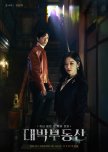
The Ghost Whisperer
Evocative, provocative, poetic, unforgettable. Daebak! Sell Your Haunted House is a tale of modern day urban fantasy featuring themes of the occult and spiritual healing that had captivated me from start to finish. Watching this drama has been an unexpectedly enthralling and almost surreal experience. From the ingenuity of the plot and characters, innovative approach to the storytelling, quality of the technical execution, compelling portrayals, expertly-engineered CGI, and finally to the beautiful music compositions, all the necessary ingredients for a well crafted production are present in abundance.I see much resemblance to Hotel Del Luna and the US series The Ghost Whisperer, where the similarities lie in the following aspects:
- A premise that’s based on assisting wandering spirits or lost souls (referred therein as ghosts), comprising mainly the malevolent as well as some clueless types, to “crossover to the other side” via supernatural means. A shamanistic approach is adopted for this show, although the practice is completely different from what I’ve seen in The Cursed, Dark Hole and others.
- The crossover process is led by a captivating FL character who is dauntless and resolute in the face of emotional adversity as she struggles to break free from the shadows of a much troubled past.
- The FL is ably assisted by a likeable and endearing ML who, in the grander scheme of things, provide balance not only to the partnership but also the spiritual zen for the both of them. It also helps immensely that their interactions give rise to such charming chemistry.
This drama showcases a unique process for clearing out ghosts from haunted buildings. Creative, innovative, distinctive and incredibly dramatic. The tools of the trade include a prodigious amount of salt, an antique brass incense holder (the incense being the key item along with the name of the dead), a “force field” gun (which looks conspicuously like a nail gun), a hairpin dagger, a protective amulet and a (un)willing psychic. The final step in the process is the exorcism itself.
The drama starts off being a case-by-case procedural that runs between a single to two episodes. There is an underlying plot concerning both the FL and the ML’s enigmatically intertwined past that manifests into the convoluted turn of events in the present day. As the story develops, the cases become unrelentingly darker while the main mystery slowly unravels via a series of wicked twists that culminates in the shocking truth of how the leads are connected to each other.
Joining our dynamic duo in their day jobs (actually they operate at night) as well as the search for the truth are the endearingly supportive secretary of the FL, and the ML’s sidekick. Both characters contribute some of the more lighthearted and comedic as well as the heartwarming moments in the show.
As far as the portrayals are concerned, this drama was made for Jang Na Ra in the lead role of the shaman, Hong Ji Ah. While initially projecting a mostly stoic and tough exterior coupled with a heart of stone, her character eventually becomes more compassionate and sympathetic. We get to witness her icy cold disposition gradually thaw to reveal a deeply vulnerable, fragile and emotionally scarred human being. There are more than a few notable scenes where Jang Na Ra shows us her impressive range, especially that powerful and heart-wrenching scene in episode 14. She truly deserves recognition for her efforts in those scenes.
In his first drama since being discharged from military service, CNBLUE’s frontman Jung Yong Hwa plays the ML Oh In Beom. His charisma makes him the perfect choice for the role of a conman who scams the unsuspecting and gullible with cleverly made-up paranormal sightings under the guise of “academic research”, which he injects with absolute fun and glee. He makes it effortless for viewers to be captivated by the quality of his portrayal that comes with a refreshing blend of levity and maturity.
Among the supporting cast, I truly appreciated the performances by Kang Mal Geum and Baek Eun Hye who play Joo Hwa Jung and Hong Mi Jin respectively. The former has a few notable emotionally-charged scenes as well as quieter poignant moments together with Jang Na Ra particularly towards the final third of the drama. The latter, on the other hand, demonstrates remarkable versatility despite her limited screen time. She delivers two markedly different portrayals of the same character, one of whom does not even have any dialogue. I think generally the women outperform the men in this drama.
The entire soundtrack is absolutely amazing. There are a total of 10 songs, with each having its own instrumental versions. My personal favourite is of course the main theme performed by Jung Yong Hwa, I Got Ya, which gives me somewhat of an 80s vibe. Jang Na Ra’s sweet vocals can be heard in the pop number DAYDREAM while NIA gives us an emotive rendition of her beautiful love ballad, Only One. Here’s the complete list:
1. Jung Yong Hwa – I Got Ya
2. Shin Minjung – Don’t Ask
3. Jang Joonghyuk – Don’t Cry
4. Jang Nara – DAYDREAM
5. NIA – Only One
6. Jung Yi Han (The Nuts) – Someday
7. Damu – In Dream
8. Want – Home
9. Amin – If i could
10. Ju Ihyun – Again
Truth be told, Sell Your Haunted House utterly caught me by surprise. Among all the K-dramas that I had been anticipating during the first half of this year, this drama wasn’t on my priority list. In fact, I did not even have such high expectations for this one. But I’m glad that it proved me wrong and delivered a truly memorable viewing experience instead. Just in case you’re wondering, it’s not that scary (for me anyway) and it has an extremely satisfying closure. This was time well spent indeed.
Was this review helpful to you?
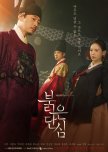
Red Heart
Bloody Heart aka 붉은 단심 which means Red Heart in hangul, is a “Faction” sageuk that presents a fictional story and set of characters within a pseudo-Joseon setting. The narrative revolves around a young King’s struggles at court against a powerful minister amidst a burgeoning romance with his childhood love.Themes of love and betrayal as well as vengeance are played out via the premise of palace politics. Some action is present, in the form of sword fights as expected of a sageuk, albeit rather briefly and sporadically sprinkled throughout but the main thrills and spills come from the political machinations and (largely verbal) confrontations amongst the major characters.
Based on the original screenplay by Park Pil Joo, this is the first sageuk drama that she has written, having previously been involved in mostly modern daily dramas. Yoo Young Eun (Queen of Mystery series) helms the production while Choi In Hee, who was recently in charge of another epic sageuk Taejong Lee Bang Won, serves as music director.
Principal photography took place at the indoor sets of Yeoncheon-gun, Gyeonggi-do, Paju-si, and Gyeonggi-do while outdoor shooting made use of Yongin Daejanggeum Park, Mungyeong Saejae Open Set, Mungyeong Gaeun Open Set, Buan Video Theme Park, and Namyangju Studio. Despite the fictional nature of the story, certain characters were purportedly modelled on real life historical figures, namely King Seonjong as King Jungjong, Queen Inyeong as Queen Dangyeong, and Park Gye Won as Park Won Jong.
The soundtrack features a mixture of western classical, including piano concertos, and traditional gugak music as the original score while 6 song compositions make up the full OST album. My personal favourite is the contemporary-traditional fusion outro theme, It’s Red, performed by alt-crossover singer ID:Earth and featuring geomungo (traditional Korean stringed instrument) specialist, Park Da Wool. Full listing as follows:
Rio (RIO) - Asrai
Kim Yeon- woo - Hope Becomes a Star
ID:Earth - It's Red (Feat. Park Da Wool)
Chungha - One Star that Blooms at Dawn
Im Sang-hyun - Let It Flow
Han Dong- geun - Because I Miss You
What I Absolutely Loved
Without a shadow of doubt, the technical execution of this drama. Specifically the direction, acting, cinematography, editing, production design, costuming, filming location, and music. This drama is absolutely gorgeous to watch and to listen to. Hands down one of the best visual representations for a sageuk (or any genre, for that matter) that I’ve ever had the pleasure of viewing. The combination of contemporary and traditional, east meets west gugak-classical fusion of the score blends harmoniously and poetically into the storytelling as well, the end result of which is a theatrical feast for the senses. Seeing and hearing is believing so don’t just take my word for it, experience it yourself!
In terms of the cast performances, two actors impressed me while a few others caught my eye as well. Jang Hyuk is simply being Jang Hyuk - the consummate professional and my favourite of the main cast. He is utterly amazing as the First Vice Premier, Park Gye Won. There really isn’t much left to say about Jang Hyuk that hasn’t been said before about this incredible actor who possesses the gravitas and breathtaking screen presence for this lead role. Bravo!
The characterization of Park Gye Won in itself deserves much praise indeed. It would be a severe understatement to merely express this character as extremely layered for he truly manifests the multifold shades of grey that carefully unravels as the drama progresses. The sheer complexity of the character design is deftly articulated by Jang Hyuk’s undeniable mastery of his craft.
It is my third time seeing Kang Han Na, whom I had most recently seen in Designated Survivor: 60 Days. Gosh, the transformation is stunning! She completely slays her role as Yoo Jung, the FL. Her inspiringly nuanced interpretation of the Royal Consort that exudes such powerful aura and indomitable spirit is nothing short of astounding. Thanks to her performance here, she makes it to my top list of enduringly memorable FLs in a sageuk, ever.
What I Generally Liked
The storytelling approach and the overall trajectory of the plot. Viewers are afforded the opportunity to gradually gain an appreciation for the introductions and backstory of the major characters as well as their motivations. Meanwhile the worldbuilding of this fictional era steadily takes its time to establish itself that eventually immerses viewers into the narrative and the atmospherics.
For the most part, the interweaving subplots and implementation of multiple plot devices are seamlessly incorporated into the overall dramatic tone that remains consistent throughout the entirety of the drama. Additionally, the scene transitions, sequencing and overall pacing largely preserves the intensity of the storytelling. What I also truly appreciate is the fact that there is unreservedly no jarring inclusion of misplaced humour or moments of levity that juxtaposes with the seriousness of this drama.
A number of performances attracted my attention in a variety of roles. This includes Lee Joon, who plays the ML, Lee Tae. I don’t particularly like his character (more on that below) but I do value his contribution to the production. His talents are beyond doubt, as seen in The Silent Sea and Bulgasal, and his portrayal of the tormented Joseon King here is worthy of acknowledgment indeed. That said, I don’t think this is his best performance and to a certain extent, this could be attributed to the characterization.
Heo Sung Tae as Minister of War, Jo Won Pyo is compelling to watch. Since Beyond Evil and the recent Squid Game, this man continues to showcase his versatility in playing diverse roles in a variety of genres. There are even times when I find myself rooting not so much for his character but for the actor behind it, which is a testament to his fine acting. The plaudits would most definitely not be complete without mention of Park Ji Yeon, who depicts Queen Dowager Choi Ga Yeon. The subtle evolution of this character amidst the intricacies of the emotional complexities involved is a credit to the actress’ exceptional quality and conviction in her portrayal.
What Could’ve Been Better
In comparison with most sageuk dramas, what this drama perhaps lacks is the warrior aspect. Granted, the primary focus of the story is on the subtlety of politics and romance rather than all out battles and violent confrontations, but IMHO every sageuk needs a captivating element concerning the way of the warrior which could have been included in a supporting capacity. I think the character of eunuch Jung is probably supposed to fulfil this role but he ends up being more of a, well, eunuch and a messenger/ errand boy. As a result, the action is very much limited and minimal in its depiction, although what little swordfighting is showcased impresses me through the finesse of the choreography. It’s somewhat of a pity, really.
The character design of Lee Tae leaves much to be desired, personally for me. In addition to the constant broodiness and look of utter dejection throughout, this character exudes toxicity, misery and sadness rather than the confidence and charisma that befits a sovereign. Sure, there are mitigating circumstances and he does have his moments, particularly when plotting schemes of entrapment and seduction, while this apparent “character growth” becomes more pronounced in the later stages of the drama.The FL Yoo Jung, on the other hand, stays true to her beliefs and principles as she takes all challenges and obstacles in her stride. Perhaps this glaring contrast in disposition has adversely affected whatever connection that they may have had certainly during their early encounters and subsequent interactions as a romantic couple. I honestly feel Park Gye Won shares a more convincing adversarial dynamic and partnership chemistry with the FL, when they aren’t even a couple, and also in his relationships with both the Queen Dowager Choi and his own wife.
For the final arc, I would have preferred more focus on shrewd political maneuverings and court intrigue rather than a prolonged melodramatic trajectory emphasised by a display of emotional fallibility through inexplicably out-of-character behaviours. This culminates in the presence of significant twists and turns that truly changed the complexion of the initial story that began. Perhaps this was the intention of the writer all along. The truth lies in the title of the drama after all. In any case and despite the emphatic closure provided, the final outcome isn't entirely my preferred ending…
Final Thoughts
All things considered and despite reservations concerning certain aspects of the plot, Bloody Heart remains quite bloody marvellous and would arguably make the list of unforgettable K-dramas in recent memory. The aesthetics alone is worth the price of admission alongside the overall exceptional quality of the cast performances and the technical aspects of the production. Fans of well-crafted sageuk dramas and/ or any of the main cast should seriously consider adding this show to the watchlist.
Was this review helpful to you?

“dele”? [Yes/No]
dele.Life is a company established by Sakagami Keishi where he and Mashiba Yutaro provide the service of fulfilling the contractual requests of their clients for complete removal of their personal information upon their demise. In other words, the deletion of digital data or “relics” that is present in their electronic devices. Hence the term dele, which means to delete. This process is complicated and fraught with uncertainty, intrigue and suspense as it involves verification of the clients’ supposed deaths, the potential for consequential impact of the content in question and ultimately uncovering the truth of the deceased's final wishes.dele is a mixed media project, meaning a production involving the medium of literary works and television dramas, entitled Project Page Turner. Initiated by crime novelist Takayoshi Honda and screenwriter-novelist Kazuki Kaneshiro, with the backing of entertainment company Kadokawa Co. Ltd, the TV drama was produced first before the completion of the novel, also of the same name.
A TV Asahi production that is directed by Taketa Tsunehiro (BG: Personal Bodyguard series) and Tomoyuki Takimoto, who also co-wrote the screenplay alongside Takayoshi Honda, Kazuki Kaneshiro (BORDER series), Takeshi Aoshima (Avalanche), Tomihiko Tokunaga (Aibou, Iryuu Sousa), and Yusuke Watanabe (Gantz, Attack on Titan). The experienced Keisuke Imamura (Avalanche) serves as cinematographer while prolific composer Taisei Iwasaki and music producer DJ Mitsu The Beats contributed to the original score and soundtrack.
This drama garnered an impressive list of accolades which includes the 56th Galaxy Award for September 2018, 13th Confidence Award Drama Awards’ leading actor and grand prize for both male leads, 98th Television Drama Academy Awards’ director awards, 27th Hashida Award for leading actor and Tokyo Drama Award 2019 for drama excellence.
What I Loved
The premise of the drama, the narrative for each episode, and the underlying themes featured. I was hooked from the get-go. This is perhaps the most fascinating application of the episodic format that I have come across in recent memory. Each episode is unique, imbued with its own distinctively compelling and poignant exposition that is conveyed with a specific storytelling approach, filming style, atmospherics, side characters and even music. All 8 episodes contribute to the character growth of the two male leads and their partnership dynamics, yet stylistically they give the impression of an anthology drama with 8 vastly different mini-stories. Divergent yet cohesive, disparate without lacking coherence. Kudos to the screenwriters for the smart writing and creative approach in reinventing familiar themes to be presented over the course of the drama.
The technical execution, which is reminiscent of a film production but in a drama format. I’ve seen a few TV Asahi productions recently and they never cease to amaze me with their quality, which is the case here as well. The drama appears very cinematic indeed, especially in terms of the direction, cinematography and editing. The experienced cinematographer, Keisuke Imamura, showcases a variety of filming techniques throughout. In certain episodes, he favours long takes of back-to-the-camera shots while in others, he employs close-ups and tilted angles to capture the sense of disorientation as experienced by characters in scenes. In terms of the editing, dele is one of the rare dramas that adopts an extensive range of editing techniques including prolonged fades in scene transitions as well as match cuts, to name a few. These variations in photography and editing methods are not just used for the sake of diversity but are put to good effect in complementing and enhancing the storylines across all episodes.
The soundtrack for dele is one of the most eclectic that I have heard in a drama production. The mix of music genres is extensive and establishes the atmospherics of the narrative. Comprising big band music, jazz numbers, classical pieces, and contemporary fusion, I’ve enjoyed the music as much as I have appreciated the storytelling and for the most part, both aspects go very well together.
The aforementioned technical excellence certainly contributes towards enabling viewers to develop the necessary emotional connection to the individual stories as well as building an attachment to the various characters. The excellent execution would be meaningless without the accompanying emotive impact and this is where dele has succeeded for me. The drama excels in articulating the complexities of the human drama and emotions in a manner that is riveting, evocative, provocative, introspective, reflective and contemplative for viewers, IMHO.
The already well written characterizations are elevated further through the fine performances of the main cast. In particular, Suda Masaki who had me in complete shock and awe at his portrayal of the affable, warm and upbeat Mashiba Yutaro. I have never encountered such a character before and in a central role, no less. It’s my first time seeing this actor in action and let me tell you, his acting is absolutely phenomenal for he truly infuses this eccentric goofball with a lot of heart and soul. His physicality or rather flexibility is astounding as well with the numerous parkour-like stunts that he executes to near-perfection. Aside from the unkempt long hair, I have absolutely no criticism of the fine work that he has done here.
Yamada Takayuki plays the co-lead, Sakagami Keishi. He is an exceptionally versatile leading actor, as evidenced by his interpretation of the role here. Despite being more understated than his co-star, he skillfully projects the nuances and air of mystery that make his wheelchair-bound character a fascinating feature of the plot that arouses much curiosity in viewers. It’s worth mentioning that the slick choreography of his fight scenes performed from the wheelchair is one of the highlights for me.
The supporting and guest cast who appear in this production are certainly deserving of mention as well. The elegant Aso Kumiko, who plays the managing partner of the law firm that sponsors dele.Life and sister to Sakagami Keishi, Sakagami Mai, is convincing as the level-headed and assertive lawyer. The veterans Yo Kimiko and Takahashi Genichiro impressed me with their painfully heart-wrenching portrayals of Esumi Sachiko and Urata Fumio respectively in one of my favourite segments of the drama that is episode 3. Hashimoto Ai makes a breathtakingly scene-stealing appearance as the stunning Kusunose Yuriko while Shibasaki Ko provides subtlety and finesse with her take on Sawatari Akina in episode 5. Episode 7, which exudes whodunit vibes, features Nimura Sawa’s enigmatic Miyagawa Akane and a strong performance by Tsukomoto Shinya as the death row convict Sasamoto Seiichi. Maro Akaji, the kindly grandfather from Lupin no Musume, makes a memorable guest appearance in the highly-charged finale.
Final Thoughts
This goes into my list of all-time favourites as one of the more unique J-dorama productions that I’ve had the pleasure to watch. My favourite stories are from episodes 1, 3, 4, 5 and 8 in particular. Exceptionally produced, brilliantly written and wonderfully acted, dele is certainly deserving of recommendation and perhaps even international distribution on major OTT platforms.
Was this review helpful to you?

Voices in the Dark
I recall reading an article in 2019 which had speculated that the Voice series had ended for good. Specifically Lee Ha Na, the most recognisable face (and voice) of the franchise had intimated that she wished to pursue other projects for a change. She ended up taking on a totally different role in the romance drama A Piece of Your Mind. As it turns out, never say never because Voice is back and led by Lee Ha Na herself again with the fourth instalment, Voice 4: Judgment Hour.It really shouldn’t come as a surprise, since it is after all one of the more successful series in South Korea having spawned adaptations in Japan (Voice 110: Emergency Control Room) and Thailand (Voice สัมผัสเสียงมรณะ). Initially launched by OCN, the first season was quite the ratings success and had garnered considerable attention mostly because of its unique concept and also partly due to the inclusion of the stellar Jang Hyuk as well as Kim Jae Wook as its main cast. Despite not quite reaching the same heights, the subsequent seasons performed decently and have seen Lee Jin Wook taking on the lead role. Now we have Song Seung Heon as the ML.
For those unfamiliar with the series, Voice is about the Golden Time Team, a specialised 112 emergency response team that is not dissimilar to the US 911 call centre but with a wider investigative scope, targeted response and its very own dispatch team. It is headed by Lee Ha Na’s Kang Kwon Joo, who is gifted with exceptional hearing abilities. She takes charge of the call centre while the dispatch team directly conducts search and rescue missions as well as apprehending perpetrators. Every season follows a similar pattern, where we have the overarching mystery of the main crime(s) committed by the major villain(s). In between, we have the episodic procedural that focuses on minor cases or in this context, emergency call-ins, which may or may not be linked to the main investigation.
For me, S1 is still the best of the lot. S2 had an ambitious cross-border premise which tied in with S3. This new S4 is completely self-contained, much like the first season. If you’re wondering whether you need to complete the earlier seasons prior to watching this one, I would say no. However, do be warned that within the first 10 minutes of S4’s episode 1, a full recap of S2 and S3 is shown. So, if you intend to watch the entire series, best to skip S4 to avoid the spoilers (because there are references throughout to the earlier seasons).
There are a couple of firsts this time around for the series. The setting of Voice 4 is moved from Seoul to the fictional Vimo Island (pronounced as Bimo in the drama but subs translated as Vimo). Although certain major events transpired in the capital during the first episode, the entire story takes place on an island that is modelled after Jeju Island. In addition to that, the drama is aired on TVN instead of OCN which had aired all the preceding seasons, perhaps reflecting a shift in marketing strategy as both channels are owned by the same parent company.
The high quality of the production remains, as regular viewers or followers of the series have come to expect. Screenwriter Ma Jin Won remains involved since the very beginning but interestingly, each season so far has been helmed by different directors. Shin Yong Hwi, who previously co-directed notable crime thrillers Tunnel and Bad Guys, takes over for this instalment. As significant portions of the principal photography took place in Jeju Island, I felt that the cinematography and production designs did not really take full advantage of the island setting. With the exception of episodes 4 and 5, where the Haenyeo (women divers) are featured along with scenes at the pier, there are no other distinguishing views of the island landscapes, which is a shame.
The premise for this season revolves around Kang Kwon Joo’s recurring PTSD as a result of her overexertions in S2 and S3. She has a new partner in Derek Jo, a Korean-American LAPD anti-vice squad leader who goes to Seoul under a joint task force with the Seoul Police Agency. The plotline is focused on serial killings purportedly by “mysterious and shadowy perpetrators” who approach their victims online before committing the heinous crimes. Things quickly escalate before the action then shifts to Vimo Island, where the team joins up with the local police force as part of the Vimo Provincial Police Agency Golden Time Team 112 Call Centre. Key elements featured include mental health issues and a religious cult/ sect, among other themes in the mix.
I actually enjoyed this season much more than S2. It is not as complicated to follow and less political, while the relationship dynamics are in no way as complex in their depictions. That said, as much as I had fun, I did find the final reveal of the antagonists along with their motivations and modus operandi to be rather absurd and far-fetched. But I think with some suspension of disbelief, there is much entertainment value to be had just by going with the flow of the fast paced storytelling. There is no shortage of action-packed sequences and thrilling edge-of-the-seat stuff, which is available in abundance here.
As far as the acting is concerned, there isn’t much left to be said about Lee Ha Na. She truly personifies the character of Kang Kwon Joo, so much so that I can’t imagine anyone else who could possibly do a better job than her. Even the Korean National Police Agency seems to think so, having made her its honorary police officer and ambassador. Co-starring with Lee Ha Na is the experienced Song Seung Heon, as Detective Derek Jo. In terms of portrayal and emotional depth, he certainly looks the part of a tough and stoic police detective with a tragic past. Probably the only issue is his English-speaking parts. The lack of fluency or an American accent for one, and the inconsistency in dialogue where sometimes he speaks Hangul to his LAPD teammate (also a Korean-American but one who speaks better English).
Son Eun Seo, Kim Joong Ki and Song Boo Geon (S2) make their return while Baek Sung Hyun re-joins the team after a 2-season hiatus. Among the new faces, Lee Kyu Hung deserves acknowledgment for his range in the portrayal of a rather “varied” role. Kang Seung Yoon plays cyber division police officer Han Woo Joo as the GTT’s resident computer whiz (a replacement of Kim Woo Suk’s Jin Seo Yool in a similar capacity for the team). Look out for memorable supporting and guest appearances by Kil Hae Yeon, Lee Jin Wook, Kim Bup Rae, Im Chul Soo and Kwon Yool.
There are 5 tracks in total for the soundtrack. My personal favourite is the hauntingly theatrical Coming to You by the young singer GRASS which sounds like a chilling version of a lullaby. Full listing as follows:
1. GRASS – Coming to You
2. Kang Seung Yoon – Your Voice
3. KLANG – No Way to Go
4. Elaine - Here for You
5. Kim Jaehwan - Promise You
All things considered, I would place Voice 4: Judgment Hour as my second favourite of the series. I still feel the first season is by far the best, and although this one doesn’t come close to reaching its levels of brilliance, it’s enjoyably engrossing with mild suspense, sufficient thrills and without the overly mind-boggling complexities to keep viewers entertained. Just in case you can't get enough of the Golden Time Team, there's more than a hint for a potential season 5 in the horizon. Looks like the franchise won't be concluding any time soon...
Was this review helpful to you?

For love of the game
Leap is a sports-themed movie chronicling the development of China’s ladies’ volleyball team, from its humble beginnings in the 1980s to its current status as one of the powerhouses in the international women’s game today. It is based on actual events and also serves as a biography for the legendary Lang Ping, a former member of the original 1980’s team of rising stars who is now the head coach of the Chinese women’s team. The story spans nearly 40 years and unfolds from the perspective of Lang Ping.With a lengthy running time of 2 hours 15 minutes, watching the movie did not feel long at all. On the contrary, it felt shorter than it actually is and progresses at quite an engaging pace. When the storytelling is deeply compelling and evokes much excitement, as do most sports-themed shows that re-enact thrilling moments of competitive events, time passes you by without you even knowing. 4 pivotal events were incorporated into the story, notably the friendly/ practice match between the women’s team and the Jiangsu men’s team in 1980, the World Cup finals in 1981 between China and Japan, the Beijing Olympic group game in 2008 between China and USA, and finally the Rio Olympics quarterfinals in 2016 between China and the hosts Brazil. Watching these events felt like watching the real thing, with edge-of-the-seat thrills and whirlwind of emotions as the games were played out. It certainly helps with the suspense when I wasn’t aware of the actual results.
In between the games, we get to see Lang Ping’s personal journey, portrayed by Bai Lang (Lang Ping’s real-life daughter) in her youth and the ever magnificent Gong Li in her later years, through the struggles she experienced in making the women’s team, her stint as the head coach for the USA women’s team, and finally taking over the coaching for the Chinese team during a transitional period of reforming the entire volleyball set up. Both actresses did a marvelous job of depicting the real life icon to viewers who may not have been aware of the emotional challenges she had faced during all the years that she was involved in the sport.
In addition, the supporting cast did a remarkable job as well - Huang Bo and Wu Gang, who played the affable Cheng Zhong He (Pang Ling’s friend and colleague) and the strict-as-hell Yuan Wei Min (Pang Ling’s first coach in the 1980s) respectively. The friendship between Lang Ping and Zhong He, in particular, was beautifully brought to life in the most naturally-portrayed manner. It’s worth mentioning that real life volleyball stars were cast as themselves for the final event, the 2016 game, as were the Brazilian players. All this adds to the sense of realism in the re-enactment of the sporting moments in the film.
The meaningfully written ending theme, River of Life 生命之河, performed by Faye Wong 王菲 and Na Ying 那英, accompanies a montage of actual competition footage in the closing credits.
This well crafted, beautifully presented and well acted production is the recipient of 8 nominations for various categories of the 2020 Golden Rooster Awards, of which it won 3 awards, namely for best picture, writing and cinematographer. And it isn’t hard to see why - the nominations and awards are truly well deserved for what has been an incredible depiction of the dramatic and eventful evolution of China’s ladies’ volleyball team over the last 4 decades.
Was this review helpful to you?

Immortality
Bulgasal: Immortal Souls was an interesting viewing experience for me. After the initial strong start, the fantasy drama evolved into a slow-burn and sappy tale of supernatural beings engaged in push-pull romantic angst filled with melodrama within a surreal dream-like ambience. Yes, I found myself inexorably drawn to its immersively hypnotic storytelling against the backdrop of two settings - briefly in ancient Goryeo / Joseon but mostly in modern day Seoul - and the rhythmic drum beats of its enthralling sageuk-inspired score.The closest resemblance that I can think of to compare this drama with would be The Twilight Saga. The Bulgasal, a fearsome immortal well-documented in Korean folklore and not unlike the ancient vampires and werewolves of the West, takes centre stage in a narrative that spans 600 years… no, make that over 1,000 years. This is a complex story of tragic loss, eternal love, betrayal, revenge, and redemption. All of these elements intertwine inseparably with one man’s curse of immortality, the titular Bulgasal, amidst the endless cycle of reincarnated lives around him.
Based on the original screenplay by the husband and wife team of Kwon So-ra and Seo Jae-won, who also co-wrote one of my all-time favourite supernatural dramas, The Guest. This was, in fact, another reason for my anticipation of this drama’s release. This TVN production is directed by Jang Young Woo, with the legendary Nam Hye Sung serving as music director. An interesting bit of trivia - despite the numerous outdoor visuals provided in this drama, in actual fact it was completely filmed at CJ ENM Studio Center. Commencing operations recently on 25 January 2021, this facility comes complete with a traditional village setting, modern drama set, virtual reality and augmented reality as well as VFX and SFX studios. It had previously hosted the production process for shows like Voice 4, Yumi's Cells, and Happiness.
What I Liked
As mentioned earlier, this drama had a very strong start with the sageuk setting of late Goryeo / early Joseon that features ancient warriors in suits of armour battling countless mythical monsters. Absolutely gritty, visceral and violent with no lack of blood and gore. The emotive aspects are provided by the portrayal of childhood abandonment and abuse, as well as traumatic loss and tragedy suffered by an entire family.
Once the plot time skipped 600 years into the future, the overall tone of the drama altered significantly. In place of ancient mythical charms, we are now presented with the unfamiliar (and appearing somewhat dystopian, though it actually isn’t) sights of present day South Korea. The deeply convoluted dynamics among the various interrelated characters begin at this point. This is not the type of melodramatic storytelling that I typically relish but there is something oddly comforting and timeless about seeing the fates of immortal beings and mere mortals intersecting emphatically before my very eyes. That said, appreciating the storytelling of this nature requires a particular mindset and I guess I happened to be in the mood for it.
As far as the production quality is concerned, I have to mention 2 aspects - the visuals and original score. Despite being nearly a complete VFX rendering, the “outdoor scenic visuals” are to die for. The many gorgeous panoramic vistas are seamlessly integrated onto the “green screen” in one of the better quality effects editing I’ve seen in recent memory. Granted it’s not flawless by any means, but does come quite close and presents an absolute feast for the eyes. Also worthy of mention would be the makeup effects created for the monsters - for once they do not appear laughably fake or cringeworthy. The original score, personally for me, is truly outstanding. I love gugak music where we have here a fusion of traditional instruments and contemporary elements producing a rhythm so captivating that I find myself completely absorbed into the storytelling.
I enjoyed the performance of the cast more so than the actual characterization, if truth be told. I think the charisma of the main lead carried the drama and, to some extent, enhanced the narrative. Lee Jin Wook as the titular Bulgasal fit the bill in all aspects. Grim, brooding yet not quite cold-hearted or cruel, as told in the folktales. Some might say his expressions are stoic and one-dimensional, but I think there is a profound grief that this man embodies through the nuanced display of his mannerisms and especially the tone of his voice. I think his character makes up for what it lacks in dynamism with emotional tenderness. Interestingly, it had been reported that Won Bin was initially offered the lead role here as his comeback drama after more than 10 years out of the industry. However he eventually declined the offer, which then went to Lee Jin Wook instead.
The second performance that I enjoyed would be Lee Joon’s portrayal of the somewhat unbalanced but rather entertaining Ok Eul Tae. The most colourful character in the show and, unsurprisingly, the fan favourite of many viewers. It certainly helps when he possesses the most outrageous taste in fashion compared to every other character. My second time seeing him in immediate succession after his equally strong performance in The Silent Sea, this man is immensely talented and utterly versatile. I have a feeling he’s one who can effortlessly take on many diverse roles and impress us each time.
The other main cast comprises Kwon Na Ra and Gong Seung Yeon. I think in terms of appearance, Kwon Na Ra is perfect as the enigmatic female figure within the historical setting. Likewise Gong Seung Yeon’s depiction of Dan Sol in the first couple of episodes comes across as dramatically evocative. Once they reappear as their modern selves, however, the aura of mystery dissipates, revealing only the characterization of the typical girl-next-door. That said, I appreciated the efforts by both in conveying their interpretation of the respective dual roles. If anything, they are both equally adept at shedding much tears.
What I Liked Less
To be honest, I would have preferred this drama to be set entirely in Goryeo or Joseon. That would have enabled the story to retain a certain level of charm and enigma, as well as to induce a more compelling approach to the storytelling. I thought the modern-day setting was rather bland and, ironically, soulless.
While I enjoyed the action sequences in the historical setting, the fight scenes in the present felt somewhat lacking. There is too much posturing for my liking and even when the monsters, in their reincarnated forms as well as the immortal ones, finally get on with the action, the choreography isn’t anything to write home about..
The characterization leaves much to be desired, particularly pertaining to the female leads as well as certain side characters. They lacked the sufficient depth that would have elevated the production but instead merely served to move the plot along towards its inevitable conclusion. I think this lack of dimension and growth perhaps hampered the development of any meaningful organic chemistry in the romance department.
Final Thoughts
Well, for all the positive aspects I would recommend the production but as mentioned earlier, the key to watching, let alone enjoying, this drama is a particular mindset for fantasy-themed melodrama. It has its moments but there is much room for improvement. In acknowledgment of the intrigue and relative entertainment value served, I’ll be generous with my rating.
Was this review helpful to you?
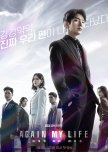
Déjà vu
Again My Life, at its core, is a political and legal thriller based on the premise of realpolitik power plays, the role of the prosecution, and systemic corruption that stems from the upper echelons of the South Korean political administration.The drama showcases elements of “time travel/ re-living the past” that lean toward speculative fiction rather than pure sci-fi or even fantasy. Additionally, it features a certain amount of action, cloak-and-dagger intrigue and aspects concerning family relationships and youth/ school themes (briefly in the beginning), as well as friendship/ team dynamics with an extremely slight hint of romance.
The plot centres on Kim Hee Woo’s crusade for justice and perhaps vengeance amidst seemingly insurmountable odds against arguably the most powerful man in South Korea - political supremo and kingmaker extraordinaire, Cho Tae Seob. He does this armed with the knowledge of the past which he re-experiences through an inexplicable turn of event while gathering a close-knit circle of comrades-in-arms who join his efforts.
This drama is adapted from Lee Hae Nal’s (이해날) debut web novel Again My Life (어게인 마이 라이프), that was serialised between 2015 to 2016 and which has also spawned a webtoon series in 2019. Directed by Han Cheol Soo and Kim Yong Min based on the screenplay adaptation by Yoo Jung Soo (Jay), Kim Yul and Lee Byung Hun. Jeon Yeo Kyung provides the art direction while Kim Jong Cheon serves as music director. Martial arts (MMA) and fight sequences are choreographed by Seoul Action School’s Kim Min Su and Lee Soo Min.
The narrative is primarily set in Seoul but principal photography for this SBS production took place in a variety of locations. These include Seoul itself as well as Incheon, Cheonan, Asan, Sejong, Samcheok, Donghae, and Busan. The fictional Korea University depicted is in fact Hoseo University 's Asan Campus. The gym run by Kang Sung Jae is Jochiwon Smoke Boxing Gymnasium. The Gimsan Branch prosecutorial office is the East Sea Research Center of the Korea Institute of Ocean Science and Technology. The exterior of Cheonha Group's headquarters is the SBS broadcasting centre located in Mok-dong. Finally, the Haeundae Doosan towers in Busan Haeundae Marine City is the setting of the epic fight between Kim Hee Woo and Doctor K in the first episode.
A total of 8 songs are listed in the soundtrack, of which my personal favourite is the catchy and upbeat outro theme, Till the End by U Sung Eun which somehow induces me to do a little dance-along whenever each episode ends. The drama also features prominently as its main orchestral theme and instrumental BGM, Gustav Holst’s hymn tune, Thaxted. This is the tune for the widely-known hymn of I Vow to Thee, My Country.
Yoon Do Hyun - What the Ggang?
Sonnet - Bring It On
Park Do Joon - Burn
U Sung Eun - Till The End
GB9 - Alone
HANHAE ft. KISSXS - Shadow
Sondia - Tragedy
Ha Dong Qn - Killing Me
What I Liked
Again My Life is an easy to watch, relaxing drama that exudes “Netflix-and-chill” vibes. It isn’t groundbreaking or original in any sense, for viewers who have watched a sufficient number of similarly themed K-productions. Despite the political-legal thriller tag, the plot lacks the required depth and complexity to make this a truly memorable viewing experience. The inclusion of “time travel” plot device doesn’t really add much more dimension to the storyline either, imho.
HOWEVER… I had fun!
The storytelling is pretty linear and simplistic in that this inherently focuses on good versus evil, embodied by an equally superpowered individual on each side of the divide. There is much scheming and plotting by both camps in the pursuit of their respective agendas but in the end, it all boils down to the final confrontation between the two main characters, which is never in doubt from the get-go. If you’re looking for complicated power dynamics and intricately-woven machinations, then perhaps your expectations would not be satiated by this drama. On the other hand, if you just want the kind of no-frills entertainment that provides eventful thrills at a sufficiently engaging pace and without exhausting brain cells or inducing angsty emotions, you’ve come to the right place.
One of the more positive takeaways from this show is the very well choreographed action sequences, particularly the MMA-inspired hand-to-hand combat scenes. These usually involve the ML fighting against numerous assailants but in a manner that appears more realistic and technical rather than merely fantastical or illogical, which is frequently the case these days. The inclusion of a number of impressive “Boss fights” certainly spices up the entertainment value even further. The nicely presented fighting scenes come courtesy of the expertly rendered camerawork, as part of the overall cinematography which has been quite decent for the most part, in this drama.
This drama features an ensemble cast that is headlined by well known leads, with a number of familiar female actresses as well. Lee Joon Gi plays the righteous and, to a certain extent, omniscient ML, Kim Hee Woo. I’ve been a huge fan for a number of years and despite the limitations of the role here, he still delivers an impactful performance where he even gets to play a teenage version of himself in a brief “back-to-school” arc. It helps immensely that he possesses an abundantly youthful countenance, and a versatile hairstyle to boot, to pull this off. Physically he is also in good form where viewers get to see him executing slick MMA moves and various stunts in his action scenes.
The controversial Lee Kyung Young plays the all-powerful main villain, Cho Tae Seob. Whenever any production requires an utterly believable and compelling antagonist for casting consideration, this man would most likely belong to that top category of candidates to call upon. Not many in the industry could boast such gravitas, screen presence and pervading aura of villainy.
The actresses involved in this project comprise Kim Ji Eun (The Veil), Hong Bi Ra, Kim Jae Kyung (The Devil Judge) and Cha Joo Young (Chimera) who portray Kim Hee Ah, Kim Gyu Ri, Kim Han Mi and Han Ji Hyun respectively. Top billing is given to Kim Ji Eun as the purported FL although her role isn’t considered significantly more profound than the rest of her counterparts who share more or less equal screen time in the grand scheme of things. Despite the initial potential and eventual possibility of a harem, it really isn’t.
Among the rest of the supporting cast, my favourite performance comes from Jung Sang Hoon as the enigmatic Lee Min Soo. The veterans of Choi Kwang Il, Jeon Gook Hwan and Yoo Dong Geun provide no small amount of experience to the production.
What Could’ve Been Better
This drama being what it is, I can’t really demand or expect much more out of the production than what was delivered in the end. That being said, I do think that there are probably three areas that could have possibly provided more personal satisfaction:
1. The romance. I wouldn’t mind seeing the ML fall in love in the process of pursuing justice. In addition, I actually shipped him with Kim Han Mi in lieu of the actual FL.
2. The characterization. Perhaps due in part to the extensive cast, the focus is shared between too many characters. I would have liked to have seen certain characters and their dynamics fleshed out more. As it is, the spotlight shines primarily on both the main protagonist and antagonist.
3. The last 2 episodes progresses much faster than the rest of the drama. Too fast, in fact. A number of details or interactions that would've provided a deeper impact to the storytelling are skipped over in favour of the final showdown between the two leading men where the other characters kind of fall by the wayside.
Final Thoughts
For all intents and purposes, this drama does reasonably well what it sets out to do, which is to provide entertainment based on a tried and trusted formula of a team of good people - led by a charismatic and ultra likeable guy - going against all odds to right the wrongs of the world by bringing the perpetrators to justice, one bad guy at a time. As I mentioned earlier, don’t expect much more; just sit back, put your feet up and chill with the show.
Was this review helpful to you?
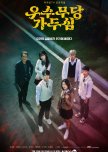
The Teenage Shaman
The Great Shaman Ga Doo Shim is a KakaoTV original production and is the first ever fantasy mystery series produced by the South Korean streaming television. It is also the ninth original program overall created by the online streaming platform since it was officially launched in 2015. KakaoTV’s primary focus is on developing short format productions including original dramas, films and entertainment programs that range from 15 to 40 minutes in length per episode and some of which are delivered in vertical form for mobile users.In-line with that focus, The Great Shaman is produced as a short web-series of 12 episodes at 20 minutes each, that airs one episode weekly.
In a nutshell, the drama tells the story of 18-year old Ga Doo Shim, who hails from a family with shamanistic abilities, as she navigates the vagaries of life complete with teen angst, real life complications and, of course, evil spirits. All this occurs when she transfers to Songyeong High School, one of the most prestigious schools in South Korea. The premise isn’t far off from Buffy the Vampire Slayer, for those familiar with the US show.
On the whole, I find this drama rather fun and enjoyable. It is generally lighthearted and easy to watch with elements of mysticism-based thrills and suspense that are not too horrifying or complex to grasp. In addition, it provides brief glimpses into slice-of-life aspects concerning school life, family dynamics, friendships and a budding romance. With a total running time of only 240 minutes, none of the themes are explored in great depth but the narrative is well paced and executed to convey the key plot points in an engaging and entertaining manner. As a low-budget web series, the production values and technical details are not significant factors to write home about. However, for the most part, the quality of the visual effects rendered and the minimalist action sequences appear to be presented well enough which come as a pleasant surprise.
The main emphasis of the storytelling is on the relationship between the two leads, Ga Doo Shim and her classmate, Na Woo Soo. This partnership largely works because of the charisma of the two leads and the rather charming chemistry that they share. Popular and much-loved former child actors, Kim Sae Ron and Nam Da Reum portray the titular role and Na Woo Soo respectively in what has been a delightful and captivating performance headlining this production. The rest of the supporting cast generally give a decent account of themselves. Special mentions go to the veterans Yoon Seok Hwa, Bae Hae Seon and Moon Sung Geung as the halmeoni, mother and principal respectively.
The soundtrack features 3 OSTs, the upbeat Run To You by Kwon Jin Ah, the evocative Dear My Nights by Seung Hee and the “couple theme” Forever Smile by Yoo Seonho. BGM comprises ominous stock music and on a side note, the voice of the evil spirit is provided by the villain from LUCA: The Brginning, Kim Sung Oh.
If you’re planning to start this, lucky you because you get to binge all episodes in one sitting compared to the rest of us who watched it while it was airing - the pain of waiting for new episodes is indeed real! Although unconfirmed at the time of writing, there is a possibility for a sequel which means we may get to see more of Ga Doo Shim and Na Woo Soo in the near future.
Was this review helpful to you?

The Travellers
Three episodes, three stories, three destinations. The common denominator that binds the diverse narrative, Haruma Miura, who appears in all three episodes of this omnibus production.This anthology miniseries is a fusion of dramatic storytelling and immersive travelogue presented in a format of three short films, each helmed by its own individual director which features a distinctive premise, storytelling approach, cinematographic style, music score and atmospherics.
Tourist is the first drama ever produced by Paravi, a Japanese premium OTT platform which began operations in the same year. Santa Yamagishi, Smith and Hatsuki Yokoo directed episodes 1, 2 and 3 respectively. The screenplays for episodes 1 and 2 were written by Yasuko Kuramitsu (Imawa no Kuni no Alice) and Yuichi Toyone while episode 3 was written by Mitsuki Yoshida. The award-winning 4-member Korean indie band, Hyukoh provided two of their hit songs for the production, namely Comes and Goes (opening theme) and LOVE YA! (ending theme). Principal photography took place across all three locations of Bangkok, Taipei and Ho Chi Minh.
What I Loved
This is a quality production with sleek cinematography that makes the most of the gorgeous filming locales through intimately framed moments and vividly depicted scenes. Each of the three episodes appears remarkably cinematic with a slightly raw edge and the kind of tastefully-rendered colour grading as well as warm palettes that I appreciate. Superb direction and design in a mostly outdoor setting has further augmented this very well produced drama.
The conceptual and somewhat surrealistic storylines that focus primarily on human drama are uniquely crafted with convincing relatability and depth to the characterizations, imbued with no lack of emotional complexity, intrigue and tension. All three episodes were a joy to behold.
I absolutely adored Haruma Miura’s performance in this entire production. His portrayal of the charming stranger in each story, Makoto Ameku, is utterly mesmerising which speaks volumes of the massive talent and charisma he possessed. To be honest, I did feel an immense sadness while watching his scenes in this drama - the world has undeniably lost such a fine actor in Haruma Miura, and we as viewers are very much the poorer for it.
Episode 1 - Bangkok
The troubled TV producer, Satsuki Nogami, played by Asami Mizukawa, faces an existential crisis where she questions the purpose of her existence before pondering the potential for cathartic release offered through death. A fateful encounter with Makoto Ameku following an incident of snatch theft leads to a session of “compensated dating” that eventually reinvigorates her outlook on life. I thought Asami Mizukawa delivered a heartfelt performance in this segment.
Episode 2 - Taipei
The due-to-be-married Honoka Tsunomori, portrayed by the effervescent Ikeda Eliza, goes on a bachelorette trip to Taipei with her friends before returning home to tie the knot. An unexpected turn of events leads to her chance meeting with Makoto Ameku, with whom she experiences an evening of thrills and spills. Ikeda Eliza manifests a youthful exuberance in her interpretation of a conflicted young woman who endures the pre-wedding jitters. This episode ended up being the most unusual and rather fun, with an infusion of Taiwanese cultural elements.
Episode 3 - Ho Chi Minh
Machiko Ono’s Kaoru Tachibana, who is going through marriage problems, chases after her two-timing husband and his mistress to Ho Chi Minh. She comes across a stranger, Makoto Ameku, who she enlists to assist her in tracking down the adulterous couple. Machiko Ono’s performance is perhaps the most nuanced in a convoluted story amongst the female leads in the drama.
Final Thoughts
Each of the stories depicted is simple yet believable, relatable, poignant and heartfelt. They subtly explore the underlying theme of self discovery where every character at long last attains a certain degree of self-actualization and closure to a chapter of their lives.
This production featuring a memorable performance by Haruma Miura truly deserves to be seen and appreciated. Despite being relatively short, Tourist has been an unforgettable viewing experience for me.
Was this review helpful to you?
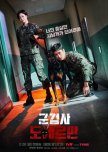
Who Let The Dogs Out
There will always be an endless supply of legal courtroom dramas, especially in K-dramaland. Likewise stories revolving around the South Korean military. But how often do we get shows that combine both genres? Well, look no further because this is exactly what this drama is about.Appropriately titled Military Prosecutor Doberman because:
a) It’s about military prosecutors who administer military justice that governs the conduct of active-duty personnel of the armed forces
b) The ML’s name is Do Bae Man, which is a homophone of doberman
c) A doberman actually guest stars in this drama
The narrative follows a pair of military prosecutors who share a complicated and intertwined past that eventually collides with the present where they battle widespread corruption that is systemic within the military organisation they both serve. In addition to courtroom battles that are adjudicated over numerous intriguing cases ranging from the garden variety to the downright awful, expect a fair amount of action as both leads are adept at hand-to-hand combat.
The drama explores themes of bullying and abuse while trigger warnings include sexual assault and violence. Moments of levity are present throughout, sometimes unexpectedly, but for the most part it isn’t a comedy. It doesn’t take itself too seriously, however, and oftentimes feels satirical. As far as realism goes, I would advise viewers to suspend a modicum of disbelief while watching this because I doubt accuracy of depiction is a mainstay of the narrative. For those wondering/ hoping, yes, there is some romance present in the story as well although it isn’t the main focus.
This TVN production is based on the original screenplay by prolific legal-themed writer, Yoon Hyun Ho, who is notable for Lawless Lawyer, Remember: War of the Son and The Attorney. Kim Jang Woo (The Veil, Do You Like Brahms?, Bad Guys) serves as music director. Principal photography took place mainly in Gangwon-do, Paju and Gimpo.
Some trivia concerning the drama - the 4th Infantry Division of the Army that appears in the play is a fictional division. The military court is answerable directly to the Ministry of National Defense and therefore is structurally impossible for the troop commander to give orders or influence proceedings in any manner.
What I Liked
Ahn Bo Hyun as ML and Jo Bo Ah as FL. I’ve seen them around but not fully in lead roles and here they’ve done a pretty decent job of carrying the entire drama. ABY has the kind of face that makes you want to laugh at times but credit to him, he manages to infuse a certain level of old school machismo and charm into the role of an extremely grey and streetsmart prosecutor. JBA possesses screen presence which I think is helped immensely by her hair. Not only when she rocks the red wig as the kickass alter ego but her bob haircut absolutely suits her soldier persona as well. She looks fierce yet stunning at the same time while exuding an aura of no-nonsense bad-assery and her action choreography is executed to perfection too.
The rest of the cast are a mixed bag for me but among those who impressed me would be the likes of Oh Yeon Soo as Noh Hwa Yeong, Kim Young Min as Yong Moon Goo and Kim Woo Seok as Noh Tae Nam. OYS is the epitome of a strong woman in this drama and I’d love to see more of such mature actresses pulling off similar characters. KYM surprised me because this is a complete departure of what I recall of him in CLOY. This guy has range and versatility, hopefully he continues to get more substantial roles in the near future. KWS perhaps plays the character with the most evolution and growth in the story which I find rather compelling.
The comedic aspect of the drama isn’t too in your face or obtrusive, but appropriately applied at the right timing with the intended effect. That is, except for one distinct moment that caught me completely off guard - a rap battle in the middle of a serious conversation. Aside from that, the seriousness isn’t overwhelming either, despite the subject matter of certain story arcs. In terms of the production quality, there isn’t much to write home about. That said, I do enjoy the stylish title sequence and the catchy opening theme, Doberman by Ha Hyun Woo. The action choreography and camerawork are not badly done while the costuming aspects of the military outfits comprising the combat and ceremonial uniforms are nicely presented.
As far as the ending goes, I quite like the positive outcome. It gives the story a satisfactory closure as well as to most major characters without any loose ends. That said, I would have liked to have seen the conclusion expanded to a number of the major players in the story but I suppose the implications are discernible after all.
What Could’ve Been Better
The overall trajectory of the story feels more prolonged than is perhaps necessary. 16 episodes is probably a little overlong for a story of this nature and the last 3 or 4 episodes do begin to feel repetitive. I personally prefer a more compact style of storytelling with the ability to sustain the excitement in the pacing and sequencing of the narrative, without the presence of unnecessary fillers or inconsequential side character arcs.
Despite being one of the central themes, the topic of bullying and abuse sometimes feel overdone for me because it is ubiquitous in K-dramaland. I would like to see something refreshingly different in the screenplay for once that provides the same impact but without the same old.
Final Thoughts
Military Prosecutor Doberman is a somewhat entertaining and feel-good one time watch that provides just enough interesting moments to make it worth my while but ultimately it isn’t anything groundbreaking or unique, despite the rarity of military-legal dramas. Nonetheless, Jo Bo Ah’s memorable performance here has definitely left a lasting impression on me.
Was this review helpful to you?

Flight 1980 to Honolulu
Everything that you’ve ever wanted to know about the technical and operational aspects of the aviation industry can be found in this movie. But don’t worry about getting confused or overwhelmed because the whole concept is conveyed in layman terms and in a very entertaining manner. The running time of about 100 minutes will quickly fly by without you noticing it.Based on the original screenplay by Yaguchi Shinobu, who also directed the film. Tokusho Kikumura (Ju-on film series) serves as cinematographer while Japanese musician Mickie Yoshino composed and arranged the music, which features Frank Sinatra’s Come Fly With Me as the theme song. Tokusatsu productions’ special effects director Hiroshi Butsuda and VFX specialist Koichi Noguchi (Tokusatsu Research Institute) are involved in the production.
All Nippon Airways (ANA) collaborated substantially on the project through the use of their commercial airliner (Boeing 747-400), equipment, personnel uniforms and hangar at Haneda airport (aka Tokyo International Airport). ANA even contributed their technical expertise to the screenplay and assembled a team to oversee the filming. The director himself researched extensively by travelling to the home of Boeing in Seattle in a bid to ensure the key elements of the story stay true to factual accuracy as much as possible.
This film was heavily promoted where 25 cities and airports all over Japan hosted the marketing campaign in 2008. Additionally the US premiere screening was held at Boeing headquarters in Seattle, Washington and attended by Joseph F. Sutter, the developer of the Boeing 747. The success of this film helped spawn 5 side stories as well as a number of TV programs and books.
What I Loved
I absolutely adore the story and the storytelling approach. I would consider this production as semi-comedic, cheerful with lighthearted undertones, highly educational and definitely moving with a lot of heart and soul. Initially coming across somewhat as a parody of aviation-themed shows, the film gradually settles into a fast-paced and action packed docudrama that consistently holds my attention. I find myself quickly immersed into the multiple perspectives of the myriad colourful characters throughout what has been a truly riveting rollercoaster ride indeed.
The attention to detail in terms of the authenticity of the technicalities involved is quite astounding. In addition to the numerous events that take place at the airport as well as in the airliner en route to Honolulu from Tokyo, viewers are also taken behind the scenes to witness the frenetic activities that go on at the control tower, radar centre and hangar. Real life people are convincingly depicted through smartly-written characterizations that include the pilots, cabin and ground crews, mechanics, air traffic controllers, radar room controllers, operations personnel and even the variety of passengers themselves. Thanks to this movie, I’ve been exposed to new jargon such as purser, pitot tube, birdstrike, and birdman, among others. I’ve even discovered that crows and pigeons are smarter than seagulls which are more likely to crash onto a plane.
Production-wise, the film has aged very well for one that was made in 2008. Neither the visual quality nor the cinematography technique appear dated. The visual effects are generally well rendered, particularly in scenes of mid-air flight. As far as the set designs are concerned, obviously the principal photography took place in an actual plane and the airport, so I have absolutely no complaints on that front.
The film features a large ensemble cast with many familiar faces and each of the portrayals are afforded almost equal screen time. For the most part, the extended focus is on Ayase Haruka and Tanabe Seiichi, who are credited as the leads in their respective roles of the inexperienced flight attendant Saito Etsuko and the young pilot, Suzuki Kazuhiro. I’m a fan of Ayase Haruko who projects a refreshing take with an upbeat and sunny disposition while Tanabe Seiichi delivers a charming and humorous depiction of the Captain-in-training.
Of the supporting cast that caught my attention, the experienced Terajima Shinobu commands the screen with her portrayal of Chief Purser, Yamazaki Reiko. Tabata Tomoko’s Kimura Natsumi is a blur of motion with her lively enthusiasm, and Eguchi Noriko catches the eye with her intriguing air traffic controller, Mizuno Yuriko, despite her limited appearance. Additionally, Ito Aiko mesmerises as Miyamoto Rie, the radar room controller.
Final Thoughts
Do not be fooled by the “fluffy and romcom-esque” poster. Happy Flight is so much more than meets the eye. I was intrigued from the get-go and enthralled all the way to the rousing conclusion of the story. In my humble opinion, this is one of the best-produced, most expansive and detailed contemporary Japanese films I’ve ever had the opportunity to savour. Kudos to the entire production team for a job well done!
Was this review helpful to you?

The Final Siege
Based on the 2007 novel, Nobou no Shiro, by Ryo Wada who also wrote the screenplay for the film. Co-directed by Isshin Inudo and Shinji Higuchi (Shin Godzilla). The theme song, Zureteruhougai, is performed by Elephant Kashimashi. Initially slated for a 2011 release, a one-year delay ensued due to the devastation caused by the Tohoku earthquake and tsunami disaster. This film eventually garnered multiple awards at the 36th Japan Academy Prize.This film feels very much like a taiga that has been condensed into a 2-hour grand production. Epic in every sense and meticulous in every detail. In spite of the slightly comedic undertone particularly pertaining to the characterization of the main lead, the narrative is quite dramatic and somewhat grim, for the most part.
What I Liked
- Production values: This is an expensively assembled film and it truly shows. The sets, filming locales, costumes, cast and sheer numbers of the extras are top notch.
- Technical execution: Cinematic visuals with attention to detail in the production design, costuming, art direction, cinematography, fight choreography in massive battle scenes and the list goes on.
- VFX component: This film utilises no small amount of visual effects, not only with CGI but also the use of "matte painting" that combines live-action with composite images of painted landscapes as the background. The end result is stunning.
- The amazing story which is a heavily romanticized account of the Sengoku period in the era of Toyotomi Hideyoshi's unification of feudal Japan.
- The performances of the cast, particularly the main lead, Nomura Mansai who won the outstanding actor award for his portrayal of Narita Nagachika. He is absolutely phenomenal where he draws upon his comedic roots from Kyogen stage acting to breathe life into this excellently written characterization.
Final Thoughts
A visual spectacle, riveting story and compelling acting. The Floating Castle is truly deserving of the numerous film honours awarded. Whether as a retelling of history or pure entertainment, the 140 minutes running time flew by easily and has been well worth the watch indeed.
Was this review helpful to you?

When heaven and hell collide
Tengoku to Jigoku: Psychona Futari is a body-swap drama that focuses on the central characters of a female police detective and a suspected serial killer, and what happens after they “switch bodies''. With their roles now reversed, from the pursuer to the pursued and vice versa, how will both characters deal with the aftermath? Will justice somehow prevail or will the serial killings continue? And will these two characters revert to their original selves before the story ends? These are the questions that will be answered as the story unfolds in what has been an intriguing roller coaster of emotions.This TBS “Sunday Theater” production is co-directed by Yuichiro Hirakawa (Tenno no Ryoriban, Tonbi, JIN), Takahiro Aoyama (Grand Maison Tokyo), and Aya Matsuki (Hanzawa Naoki, Tokyo MER). The story is based on the original screenplay by Yoshiko Morishita, who has written for many well-known dramas such as JIN 1 & 2, Tonbi and Tenno no Ryoriban, among many others. The prolific composer Yu Takami (BG: Personal Bodyguard, Library War, Ichiro) serves as music director. The 1st movement Allegro con brio of Beethoven’s Symphony No. 5 (Fate) is used as the opening theme where the famous motive recurs throughout the drama.
The concept of the body swap is based on the Japanese myth of the Moon and the Sun that originates from Kagoshima and Amami Oshima, where legend has it that “the moon was supposed to be the sun and the sun was supposed to be the moon" in a dark twist of fate that changed the positions of the two entities forever. Interestingly in the drama, the body swap actually takes place during a full moon.
This drama attracted much attention on MDL last year and I can finally comprehend why. The hype is truly justified, so much so that it had garnered a number of accolades including the 24th Nikkan Sports Drama Grand Prix with Leading Actress Award for Haruka Ayase and the 107th Television Drama Academy Awards with Leading Actress Award for Haruka Ayase and Supporting Actor Award for Issei Takahashi.
What I Liked
The acting is truly phenomenal, as reflected by the awards won. The thing with body swap stories is that the role reversals have got to be very well executed, otherwise the entire concept would fall flat. Fortunately that is not the case here and the portrayals by both leads are absolutely on another level, particularly that of Takahashi Issei. How he switched personalities from a gender perspective and utterly assumed the personification of both distinctively disparate characterizations is remarkable beyond doubt. Seeing is believing and having witnessed the performance firsthand, I’m completely mind-blown! From the overall body language down to the intimate mannerisms and subtle quirks, Takahashi Issei killed it as both female detective Mochizuki Ayako and psychotic Hidaka Haruto.
Ayase Haruka is no less impressive herself and demonstrates a masterful display of juxtaposition between the freneticism of Mochizuki Ayako and the ultra coolness of Hidaka Haruto. Generally the more subtle of the two leads, Ayase Haruka brilliantly projects the nuanced microexpressions that convince viewers to immediately buy into the personality switch. The interactions between Takahashi Issei and Ayase Haruka are a particular joy to watch and certainly elevates the storytelling even further because they share such wonderful chemistry that adds profound depth to their characters’ dynamics.
As far as the story is concerned, there are two components to the plot - the criminal investigation and the body swap mystery. I was actually more captivated by the body swap segment, for obvious reasons. Nonetheless, the investigation aspect is quite smartly written although it isn’t a particularly inventive or refreshing take on the crime genre.That said, I do appreciate a certain unexpected twist thrown in towards the end. In fairness, this isn’t a drama that is overly complex on the uptake and it does not take itself too seriously either. Despite the gruesome nature of the crime and depictions of gore, as well as certain dramatic moments of emotionally heavy dialogues, the drama is mostly lighthearted with instances of comedic relief interspersed throughout.
From a technical perspective, the art direction and set designs are quite decently rendered. There are gorgeous vistas of the Amami Oshima filming locale on full display while I also enjoyed the costuming aspects where both leads sported rather fashionable wardrobe selections. The poignant theme song Tadaima (I’m Home), beautifully performed by Aoi Teshima, is one of the highlights of the drama as well.
Final Thoughts
Tengoku to Jigoku: Psychona Futari is a relatively engaging viewing experience that isn't without imperfections. Where it leaves a deep impression is through the acting of its leads. It is the one single aspect that literally blew my mind away and because of that, I won’t be forgetting the performances any time soon. If you weren’t a fan of either lead before this, you might have to change your mind after watching this drama.
Was this review helpful to you?
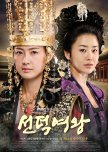
The Regnant Queen
Queen Seon Duk is a critically acclaimed epic sageuk production that continues to be held in high regard even to this day, since its release more than a decade ago in 2009. It has taken me just as long to finally watch this remarkable drama as part of my classic watch project, and what a fulfilling journey it has been. All the plaudits rained upon this production have been well deserved indeed, where it has won numerous awards, including honours at the 46th Baeksang Arts Awards.The Story
The drama is partly a biopic, which cleverly fuses fact and fiction. Set during the turbulent period of the Three Kingdoms, the premise is based on the official records of the Samguk Sagi and Samguk Yusa. However, the storyline is primarily driven by the events chronicled in the controversial Hwarang Segi. The screenplay is infused with much creative liberty, thanks to the writing flair of dynamic duo Kim Young Hyun and Park Sang Yeon, who have written countless epic sageuk including Jewel in the Palace, Tree With Deep Roots, Six Flying Dragons and Arthdal Chronicles.
Queen Seonduk, the first female sovereign of Silla, and her achievements have been celebrated through the ages across all historical texts. On the other hand, historians have argued whether Lady Mishil, her arch enemy, had existed in the first place. Nonetheless, regardless of the historical accuracy, the characters and events are magnificently depicted in this incredible story of love, revenge, betrayal and sacrifice.
The Production
For an MBC drama that was released back in 2009, the general quality of production is worthy of praise indeed. Filmed on location at MBC’s famous outdoor film set, Yongin Daejanggeum Park as well as Shilla Millennium Park, thus reflecting the high levels of authenticity in its set designs. The costumes in the drama, particularly those of the Hwarang, are deserving of acknowledgment.
On the other hand, the cinematography feels quite dated in terms of the camerawork and the typical overuse of close-ups, which is prevalent in older sageuk dramas. You really do get to see actors’ microexpressions up close and personal. The action choreography is not the best, in terms of the swordplay and fight sequences. Interestingly, although this is a sageuk, there are elements of wuxia blended into the choreography. Perhaps this is influenced by Hwarang Segi’s almost fantastical account of the legendary powers of the Hwarangs of Silla.
The Characterisation
This is one of those rare occasions where I actually root for the bad guys instead of the good guys. Although this drama is focused on the character development and accomplishments of Queen Seon Duk, I was won over by Go Hyun Jung’s characterisation of Lady Mishil. She successfully encapsulated this larger-than-life figure who is arguably the epitome of female empowerment, charisma and wit, despite being the ultimate villain. This woman has screen presence and gravitas aplenty, and I honestly feel that she carried the entire show. Other character portrayals that I have enjoyed include Kim Nam Gil’s extraordinary interpretation of the complex and layered anti-hero, Bidam as well as Jung Woong In as the somewhat amusing and rather fun Misaeng.
On the contrary, I feel that Uhm Tae Woong’s depiction of Kim Yoo Shin is a bit flat, where he wears the same lifeless stoic expression throughout the whole show. Meanwhile, Yoo Seung Ho’s Kim Chun Chu is rather one-dimensional. I do think that Park Ye Jin’s Princess Chun Myung is more convincing than Lee Yo Won as Princess Deok Man and later Queen Seon Duk. I know Lee Yo Won has her admirers but I think she was outshone by Go Hyun Jung who went on to win the Daesang at the Baeksang.
Music
The original score, composed by Eom Ki Yeop, is exceptional for a production of this magnitude. Most sageuk soundtracks tend to be inspiring and surreal, which is the case here as well. The main title, comprising upbeat orchestral music, is an absolute favourite. I also love Mi Shil's Theme (미실 테마), an evocative operatic aria. Viewers may not be aware that IU contributed a song to the soundtrack, the lighthearted and catchy To the sea (아라로), which is a fusion of traditional instruments and pop music.
Overall
Queen Seon Duk is actually composed of three major arcs - the first 25 or so episodes before Princess Deok Man enters the Silla palace, the beginning of the palace politics that transpire in the second arc, and the final phase after the key events that take place in episode 50. I personally enjoyed the first arc, which had a measure of action, adventure and excitement. The second arc feels somewhat more regal and solemn in terms of the court machinations. The last 12 episodes probably could have been set aside, since I’m rather torn with the ending especially for one of the characters in question but, suffice to say, all loose ends are neatly tied up.
For fans of epic sageuk, this drama is certainly worth your while to check out. It might be a little old, but this is definitely gold.
Was this review helpful to you?


 20
20 34
34 7
7


















